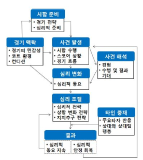
Purpose This study was conducted to investigate the appropriateness of the concept of condition for athletes and to conceptualize condition in a way suitable for field and then to produce a tool to test condition that reflects usability. Methods 30 college athletes and national athletes with more than 5 years of experience were selected. In the conceptual review stage, the appropriateness of the concept of condition was verified. In the conditional element collection stage, the condition concept reflecting usability was extracted. In the development stage of the conditional questionnaire, a condition questionnaire was developed in consultation with the data provider to reflect usability. Results Previous studies on the condition of athletes were complicated and the necessity for consideration of usability was raised. As a result of conceptualization with consideration of the application to the sport scene, condition in a scene is summarized into both physical and psychological states. As a result of the appropriateness evaluation of the tool that produced the condition inspection tool reflecting the condition element based on universality and peculiarity of conditionality, the athletes evaluated that the condition inspection tool properly reflects condition, is easy to apply and can be used for condition control. Conclusion The development and application of psychological testing instruments reflecting usability will accelerate the application of sports psychology in the appropriate direction. The reflection of usability will contribute not only to the reliability and validity of the psychological testing tools used in the field of sports psychology, but also to the improvement of the possibility of intervention by leaders and athletes, the convenience of development procedures, and the utility of response results.

PURPOSE This study aimed to develop and implement a customized mental plan program to facilitate an optimal psychological state and peak performance among para shooting athletes. It also sought to empirically verify this program’s psychological effects by focusing on improvements in concentration, confidence, and relaxation. METHODS A total of six para shooting athletes who had earned medals in the Paralympic Games underwent six program sessions that were designed and implemented based on attention-related psychological factors identified through open-ended surveys and in-depth interviews. RESULTS The athletes’ attention was facilitated by task-focused behavior, breathing control, performance routines, and physical condition management. Meanwhile, their concentration was hindered by task-irrelevant thoughts, negative physical states, and external distractions. These factors were further categorized according to competition phase: the day before, precompetition, and during competition. Based on the statistical analysis, significant improvements were observed in the athletes’ concentration, confidence, and relaxation. CONCLUSIONS The custom program was practically effective as an intervention for psychological skills tailored to experienced para shooting athletes’ individual needs. The findings offer valuable insights for developing strategies supporting the psychological states of athletes in disabled sports.
This study was to explore the factors influencing Olympic performance positively and negatively. In order to achieve this purpose, 60 athletes, who participated in 2012 London Olympic games, responded on open-ended questionnaire. In addition, 10 athletes, who won medals in London Olympic, responded on in-depth interview. Collected data were analyzed by deductive content analysis. The results of this study were as follows: firstly, the factors influencing Olympic performance positively were psychological preparation, strengthening training, physical conditioning, support from significant others, material support, cheering of Korean people, self respect as a Korean national athlete, different game environment, team cohesion, sharing Olympic experience, and support of sports science. Secondly, the factors influencing Olympic performance negatively were psychological pressure, excessive expectation, negative interpersonal relationship, condition decline, overtraining, unstable environment, insufficient facilitation, decrease in performance level, and especially ineffective village room placement and media management during Olympic period. Thirdly, the differences between Olympic games and other world competitions , perceived by athletes were competition scale, psychological attitude, training support, systematic preparation, and benefits from winning medals. The results of this study will give fundamental information in developing a scale which can measure Olympic preparation level and in developing Olympic preparation guideline. Therefore, it will help athletes ,who participate Olympic for the first time or athletes who did not perform well in pre-participated Olympic games, to understand and apply in training the factors influencing Olympic performance and help them to perform better in Olympic games.
PURPOSE Players’ nonverbal behavior during a game may be expressed through selfregulatory and intentional processes, where nonverbal cues are strategically used to achieve specific outcomes. This study aimed to observe and explore the strategic and intentional nonverbal behaviors utilized by table tennis players. METHODS The study utilized a grounded theory methodology and involved purposeful sampling of ten adult table tennis players. Semi-structured face-to-face interviews were conducted. The collected data were analyzed using open, axial, and selective coding techniques. RESULTS The findings revealed that players’ intentional nonverbal behaviors are influenced by their confidence levels, physical condition, and perceptions of others’ nonverbal cues. Throughout this process, players underwent various emotional experiences, worked to maintain a positive mental state, and experienced changes in both their behaviors and psychological states, which impacted the flow of the game. CONCLUSIONS This study’s results provide valuable insights into the role of intentional nonverbal behaviors utilized by athletes during competitions. This suggests that understanding and incorporating intentional nonverbal behavior should be a key consideration in sports psychology counseling and psychological skills training.
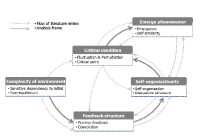
Purpose This study was aimed at interpreting the football talent development stages based on complexity theory. Methods The data for this study was gathered through literature review and in-depth interviews that were analyzed by thematic analysis. Literature review of the studies regarding complexity theory revealed the features of complexity theory and five football players participating in the K-league were interviewed. Gathered materials were analyzed by the thematic analysis. Initial codes and potential themes of football talent development stages, the conception and potential themes of the complexity theory were interpreted by metaphorical analysis. Results Results of literature review were as follows: analysis frame of complexity theory were organized environment of complexity, feedback structure, self-organization, critical condition and emergent phenomenon. The football talent development stages, interpreted as a result of literature review, were divided into Potential Talents, Excellence based Talents Development, Footballizational Talents, Football to Takeoff and Personalization of Football Talents. The stages were specifically materialized as follows: Potential Talents was materialized into physical condition, physical activity preference and change of environment. Excellence based Talent Development was materialized into skill mastery, thoughts about football and relationship with significant others. Footballizational Talents was materilized into skill fractionation, football flow and growth experience. Football to Takeoff was materialized into overcoming crisis experience, performance scaffolding and performance takeoff. Personalization of Football Talents was materialized into manifestation of performance personalization, performance evolution, condition maintenance. Conclusion Football talent development stages, interpreted by means of complexity theory, were divided into Potential Talents stage, Excellence based Talent Development stage, Footballizational Talents stage, Football to Takeoff stage and Personalization of Football Talents stage. Utilization of this study as a fundamental resource of football talents development programs and as a means to understanding football talents development is looked forward to.

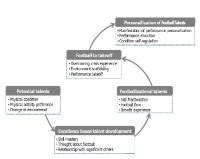

The purpose of this study was to confirm the differences between winner and loser groups of national team participated in the World Taekwondo Championships statistically and trends of psychological status according to applying mental coaching. In order to achieve the purpose it was the selection of 16 national members participated in the 2013 World Taekwondo Championships in Puebla. Data was selected by TOPS(test of performance strategy). The survey was conducted before and after applying the mental coaching and the game soon after. Data processing results were calculated utilizing Excel and SPSS 21.0 version. Based on the findings issue the conclusions were as follows. First, the psychological state of the winner and loser groups showed a different trend in the self-talk, emotion control, performed automatically, imagery, struggle, negative thinking, relaxation, condition factor. Winner group was shown maintenance or better trends of psychological state in the three times measurements on the other hand, loser group was shown decrease in the game soon after. Secondly, winner and loser groups are statistically significant differences in the psychological state of competition in self-talk, struggle, negative thinking, solving tension factors. In other words, The winner group had higher score in the four factors than loser group in the competition.

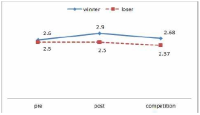
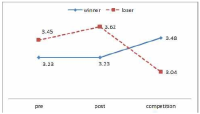
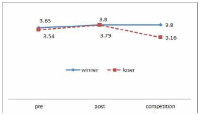
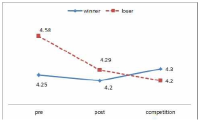
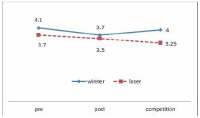
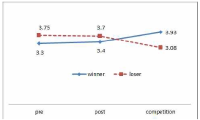
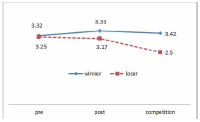
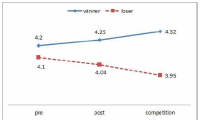
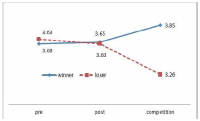
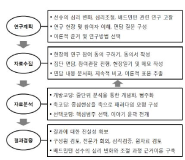
This study was purposed to explore psychological change and regulation process during badminton competition. The data were conducted using group interviews and participation observations who 18 K college badminton players. The data were analyzed using open, axial, and selective coding based on grounded theory method (Strauss & Corbin, 1998). The results were as follows: Open coding results, 89 concepts, 44 subcategories, and 18 categories emerged as psychological change and regulation process during badminton competitions. Axial coding results, the categories are showed structural relationships such as performance, score, psychological momentum, the importance of competition, court environment, physical condition, competition strategy, psychological preparation, past experience, outcome expectation, psychological disturbance, psychological skills, game situation-changing strategy, support-seeking strategy, significant others' behavior, the opponents' behavior, psychological resilience, and maintenance psychological disturbance. Selective coding results, core category of this study was revealed to maintain psychological homeostasis. Environmental context during badminton competitions causes specific situations and events that evoke psychological disturbance. In turn, a player seeks mental and behavioral strategies to maintain psychological homeostasis. There is psychological homeostasis mechanism during badminton competitions for peak performance. Development of proper interest for psychological homeostasis will be improved through this research approach in sport psychology.

